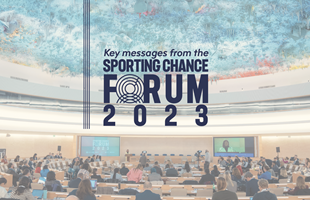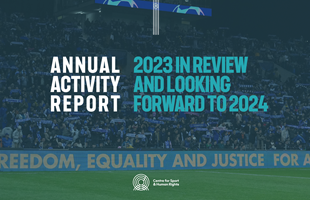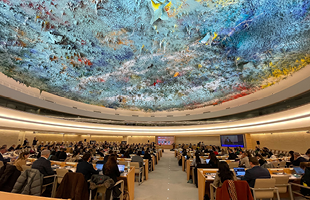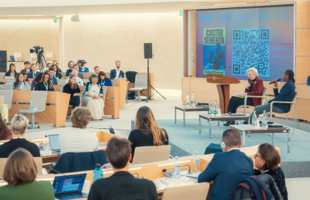The Deputy Secretary-General of the OECD Opens 2019 Sporting Chance Forum
29 Nov 2019
Author - Jeffrey Schlagenhauf
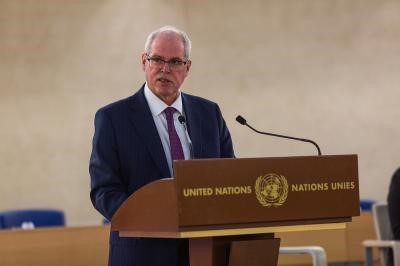
The Sporting Chance Forum, held on 21st and 22nd November in Geneva in the historic Room XX of the UN Palais des Nations, serves as a powerful opportunity to discuss the key human rights issues, and their solutions, that exist across the world of sport.
Hosted by The Centre for Sport and Human Rights, International Labour Organization, Office of the UN High Commissioner for Human Rights, and UN Office in Geneva, the programme explored how different actors in the world of sport can use their individual and collective leverage to achieve a world of sport that fully respects human rights.
Opening the Forum alongside the Director General of the International Labour Organisation, the UN High Commissioner for Human Rights, an former international footballer and human rights advocate Craig Foster, was Jeffrey Schlagenhauf, the Deputy Secretary-General of the Organisation for Economic Cooperation and Development - whose remarks are available below:
Ladies and Gentlemen,
I am delighted to be here today for this important event, the fourth Sporting Chance Forum. The OECD is committed to the success of this event and of the Centre for Sport and Human Rights.
We have been a member of the Centre’s Advisory Council since the outset. Throughout our journey with the Centre for Sport and Human Rights we have seen the importance of collaborative work and collective action.
Sport teaches millions of people about values such as fair play, team spirit, respect for others, but also the importance of playing by the rules and having a level playing field. Mega-sporting events involve high levels of public expenditure, large-scale investment from sponsors, together with high-value media contracts.
This creates a high stakes, a high risk environment for sports organisations, whose operations are often subject to little external oversight. Because of this, the risks of corruption and human rights violations are elevated.
Fighting violations of human rights and combatting corruption go hand in hand. In the sporting context, this is a multifaceted challenge which requires cross-policy coordination and joint efforts by governments, companies and sport organisations. This is precisely the goal of the OECD’s work in addressing these challenges.
On the anti-corruption front, the OECD, together with other international organisations, sports organisations, governments and stakeholders, has established IPACS, the International Partnership against Corruption in Sport.
IPACS, to which the G20 countries have committed in the 2019-2021 G20 Anti-corruption Action Plan, works towards better policies which can help pre-empt a number of challenges in those areas where the risk of corruption is particularly high. These include procurement processes related to sport infrastructure, the selection of major sporting events and governance of sport organisations. Now IPACS has also launched a new work stream promoting cooperation between sport organisations and law enforcement entities.
On the remedy front, the OECD coordinates a network of non-judicial grievance mechanisms: the National Contact Points for Responsible Business Conduct.
NCPs are national implementing bodies for the OECD standard on Responsible Business Conduct, the well-known OECD Guidelines for Multinational Enterprises. In that capacity, NCPs can receive cases against companies having allegedly breached the Guidelines, and facilitate the search for a solution by the parties through mediation or conciliation.
This mechanism is increasingly used in relation to sports-related cases. For example, in 2017 the Swiss NCP helped FIFA and the global union federation Building and Wood Workers International reach an agreement regarding the labour rights of workers employed on World Cup stadium construction sites in Qatar.
NCPs are therefore a promising avenue to address sports-related RBC issues, as evidenced by the regular addition of new cases, such as the one currently before the NCP in the United Kingdom in relation to human rights impacts linked to Bahraini sponsorship of an important horse race in England.
On the local development front, in May 2018 the OECD Council adopted the OECD Recommendation on Global Events and Local Development. This Recommendation applies to sporting events and sets the framework conditions to ensure that such events deliver on the promises they hold for host cities and nations. It contains concrete guidance for Governments regarding planning, delivery, evaluation, governance and partnerships with other actors. The Recommendation promotes the respect of human and labour rights throughout the event lifecycle to ensure community benefit and the creation of quality jobs.
The OECD has also developed a forward-looking Implementation Strategy to help cities and countries achieve more sustainable global events and build stronger capacities to leverage local benefits for all.
Through its involvement at these various junctures, the OECD is firmly committed to helping sport organisations and the sports industry develop best practices of integrity and sustainability.
The OECD’s membership in the Advisory Council of the Centre for Sport and Human Rights is testament to this, as is, for example, the Memorandum of Understanding concluded in July this year by the OECD and the IOC to reinforce collaboration in promoting ethics, integrity and good governance, as well as peace and sustainable development in sport.
In conclusion, we know that it is of paramount importance that the world of sport is free from harm. The vision set out in the Sporting Chance Principles on Sport and Human Rights helps us make sure that we are all headed in the right direction. By working together in innovative ways we can ensure the world of sport matches up to its own core values.
Thank you.
